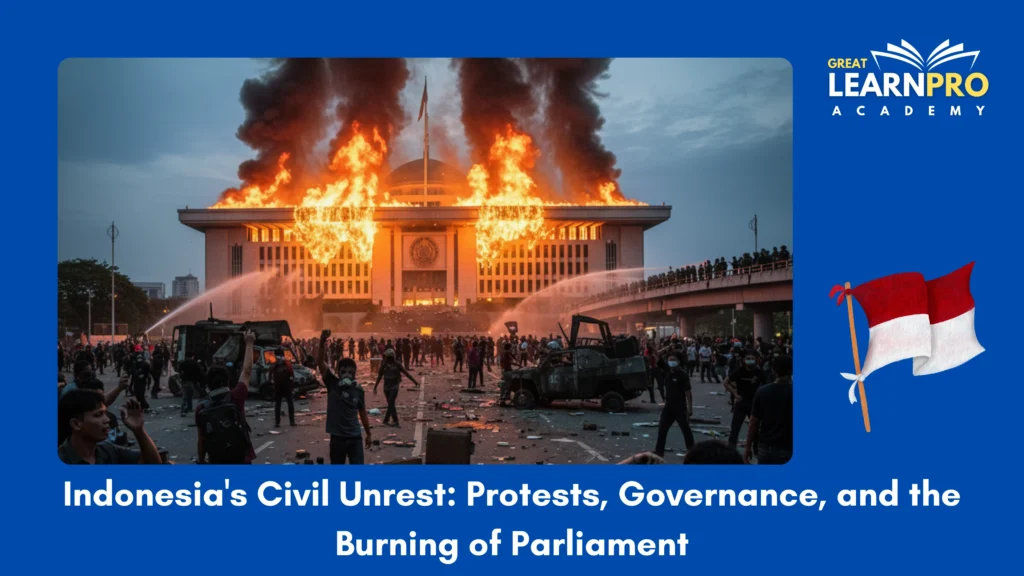
Civil Unrest in Indonesia: Governance, Democracy, and the Burning of Parliament
Indonesia, the world’s third-largest democracy, has been engulfed by widespread civil unrest that has shaken the very foundations of its political system. Protests, initially triggered by revelations about lawmakers’ lavish allowances, have spiraled into violent demonstrations across the country. The most symbolic and shocking incident was the burning of the regional parliament building in Makassar, South Sulawesi, where three lives were lost and many more were injured. The event has forced Indonesians to confront fundamental questions of governance, accountability, and the responsiveness of democratic institutions.
Governance and Public Accountability
At the heart of the unrest lies the perception of a widening gap between elected representatives and the citizens they serve. Reports revealed that members of Indonesia’s House of Representatives receive a housing allowance of around 50 million rupiah (USD 3,000) monthly—almost ten times the minimum wage in Jakarta. For ordinary citizens facing rising costs of living, this benefit became a symbol of privilege and misuse of public funds.
The discontent escalated when a young ride-hailing driver was killed after being struck by a police vehicle during a demonstration. His death, captured in a widely circulated video, turned the anger against not just lawmakers but also against state institutions, particularly the police. The protests now reflect a deeper demand: that the state remain accountable to its citizens, particularly in the face of systemic inequality.
Civil Unrest and the Limits of State Power
The spread of protests from Jakarta to Bandung, Surabaya, Bali, and South Sulawesi reveals how grievances can rapidly escalate when governance is seen as unresponsive. In many regions, public anger translated into attacks on symbolic institutions such as police headquarters and parliament buildings. The burning of the Makassar parliament stands as a striking act of defiance, where the seat of legislative authority itself became the target of popular rage.
The state’s response has been twofold—announcing inquiries into the young protester’s death and suspending lawmakers’ foreign trips, while simultaneously deploying military vehicles and strengthening crackdowns. This duality reflects a common constitutional dilemma: to what extent can a democratic government limit the right to protest in the name of public order?
Constitutional Principles at Stake
Under Indonesia’s constitutional framework, freedom of expression and assembly are guaranteed, but subject to reasonable restrictions in the interest of public security. The protests thus highlight the tension between civil liberties and state authority—a tension also familiar to other democracies, including India. Excessive force against protesters has been criticized by rights groups, which argue that the state risks undermining the very democratic values it claims to uphold.
The burning of parliament raises another critical constitutional issue: the legitimacy of representative institutions. If citizens lose faith in legislatures as vehicles for addressing grievances, democratic legitimacy itself weakens. Public trust in governance is not only a political necessity but also a constitutional requirement in any democracy built on the consent of the governed.
Democratic Lessons for the Future
Indonesia’s unrest serves as a stark reminder that democracy cannot survive on procedural elections alone. It requires genuine responsiveness to public concerns, transparency in the use of public resources, and a commitment to equality before the law. The violent acts of protest, while unlawful, are also symptomatic of deeper structural frustrations.
For President Prabowo Subianto, the crisis is both a challenge and an opportunity: a challenge to maintain order without compromising constitutional freedoms, and an opportunity to embark on reforms that close the gap between political elites and the people. Without meaningful change, the unrest risks deepening, threatening both domestic stability and Indonesia’s standing as a vibrant democracy in Southeast Asia.
Conclusion
The civil unrest sweeping through Indonesia, culminating in the burning of a parliament building, is more than a law-and-order problem. It is a constitutional moment—a test of whether democratic institutions can remain legitimate, accountable, and responsive in the face of rising inequality and public disillusionment. The future of Indonesia’s democracy will depend not on the strength of its police forces, but on the strength of its commitment to governance rooted in justice and accountability.
Sources
- https://apnews.com/article/16cc8b10279d22efc9112d64d86929df?utm_
- https://www.ft.com/content/5f44a15e-74de-4024-a604-5b717f7d09fc?utm_
- https://www.washingtonpost.com/world/2025/08/30/indonesia-violent-protests-makassar/dcd3218e-857d-11f0-a8f4-28ba053d904b_story.html?utm_
More Current affairs: https://learnproacademy.in/updates/
